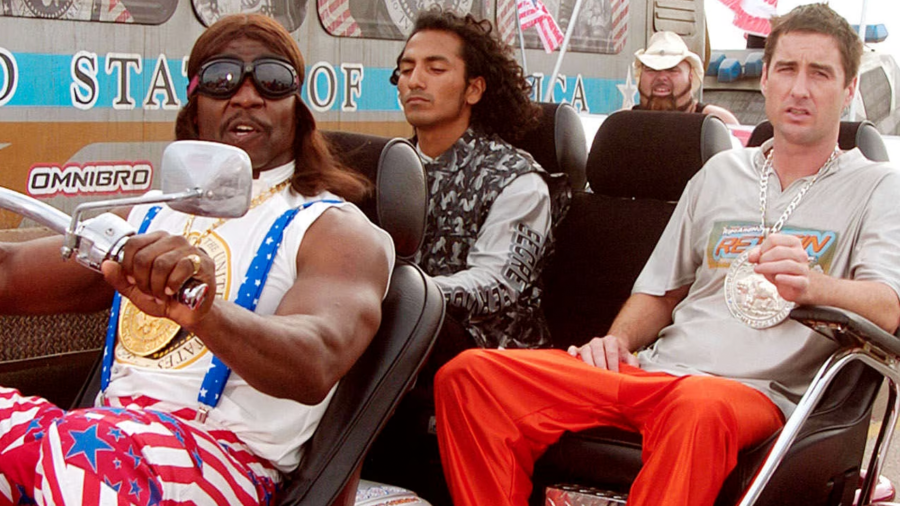How Deadpool Fans Battled Fox Lawyers To Get The First Movie Made, A Firsthand Account
Setting the record straight about how the first Deadpool movie got made.

The year was 2010 and my inbox was full of spam, as usual. Near the bottom of my new messages was a suspicious looking email with no title and an attachment. The email itself said only “read this”.
I’m not a fool so my hand hovered over the delete button, ready to destroy this obvious virus trap without opening it.
Then I read the title of the attachment. It was “the_deadpool_script.txt”
I’d heard rumors of this script’ existence. At the time few knew much about it, other than that Ryan Reynolds wanted to star in it. Back then, he was mostly known as Van Wilder.
Though it was Fox that commissioned Paul Wernick and Rhett Reese to write this Deadpool script, they wanted nothing to do with the finished product. 20th Century Fox made it clear they were definitely not making a Deadpool movie.
After a battle with myself, curiosity won over. I updated my McAfee anti-virus software, held my breath, and opened the attachment.
No alarms went off and it popped up on screen like any normal, unformatted text document should. Inside was a script. The Deadpool script written by Rhett Reese and Paul Wernick. Or at least it was something that appeared to be that script.
Fake scripts being sent to journalists as a form of trolling was a thing back then, so I was skeptical as I began reading. It soon became clear that if this was a fraud, it was one of the greatest and most detailed frauds imaginable.
I laughed out loud on page one.
My nervously natured Beagle, lying on the floor beneath my desk popped up and looked around with concerned energy.
“Go back to sleep Tessa, it’s fine.”
I kept laughing. I found myself in the midst of one the most uniquely great scripts ever to come across my desk. No one had made a movie like this before. As I read further, it soon became clear to me that no one ever would.
The movie was gleefully profane, over the top violent, and it made vicious fun of Fox.
This was the same 20th Century Fox that buried Mike Judge’s Idiocracy in 2006, for making fun of the company’s corporate partners. There was no chance anyone at Fox would greenlight this for exactly the same reason they’d stuck a knife in the back of Mike Judge.

But the script was brilliant. I typed up a glowing review, in which I begged Fox to make it anyway and championed Ryan Reynolds as the only man who could play this character. The script seemed as if it was written with his voice in the writers’ heads. It was clear after reading that Ryan Reynolds was born to play Deadpool.
I published my script review on Cinema Blend, and expected that was the end of it.
Here’s an excerpt from that Deadpool script review, which no longer exists on the internet, for reasons you’re about to discover:
In its best moments, reading the Deadpool script is like reading ‘Van Wilder’ meets ‘Kill Bill’, a genius mix of insane dark comedy and ridiculous over the top violence the likes of which we’ve never seen in any other superhero movie before. With the right director and Reynolds in the lead, this script has the potential to be The Dark Knight of R-rated superhero movies.
Josh Tyler, CINEMA BLEND (2010)
The next day I got an email from a PR agent at Fox. In it they pretended to be my friend and asked I remove my review since the movie wasn’t being made.
I laughed and ignored the email.
By this point talk of the Deadpool script was blowing up the internet and Cinema Blend web traffic was through the roof. Social media was in its infancy and message boards were still a dominant force. Those began to spawn thread after thread of discussion from fans who now needed to see this movie.
Other websites began to pick up my review and everyone wanted a copy of the script.
And that meant Fox was now really, really pissed.
Two days later my phone rang, displaying an unnamed number from Los Angeles. I picked it up and found myself on a speaker phone in a board room full of people, conversing with a high up studio executive, whose name you’d know if I told it you.
He demanded I remove my review immediately and began threatening legal action if I didn’t. His board room full of lawyers chimed in with vague justifications to back him up. I listened politely but said I saw no need to comply. There was no copyright issue and my review was protected by the first amendment. I’d never quoted or used any part of the script in my writeup, only critiqued it. Criticism, I naively thought, was protected speech.
That’s when the yelling started. It soon transitioned into profanity-laced name calling. I listened silently for awhile and eventually hung up the phone.
It rang again. The same number. I put it on silent and never answered that number again.
It didn’t stop them. Soon after, a cease and desist letter showed up in my mailbox. Fox’s lawyers began threatening a spurious lawsuit they knew they’d lose just to drain Cinema Blend’s rather small business savings account and get us hauled off the Internet.
Though Fox had no legitimate legal grounds to demand the review’s removal, they were ready to waste mountains of money to make me and Cinema Blend’s employees suffer. My lawyer told me we had no choice if I wanted to protect my staff, and so I was forced to remove my Deadpool script review.
The statement I replaced the review with no longer exists on the proper internet. but it is still available on the Internet Archive. Here’s an excerpt:
Regettably, we’ve had to remove our review of the Deadpool script from this page and Cinema Blend. The review contained absolutely no content quoted or taken from the 20th Century Fox’s Deadpool script, nor did it promote or enable the downloading or reading of the script elsewhere. Additionally, it contained very few spoilers and almost no plot synopsis of any kind.
Unfortunately the Fox Entertainment Group’s intellectual property counsel has notified us that, in spite of this, they believe the review violated their rights to Deadpool. According to the take down notice we received, they believe that the disclosure of “uncontrolled information” about their film before its release damages their rights, and so they’ve demanded the removal of the content on this page.
Josh Tyler, CINEMA BLEND (2010)
Cinema Blend took down the review. But we kept manufacturing new ways to spread word of the Reese and Wernick’s genius. Soon others took up the mantle, prompting their own face-off with Fox’s evil cadre of flying monkeys disguised as suit wearing lawyers
The genie was out of the bottle, the lawyers were too late.
Interviewers who’d read my script review began asking Ryan Reynolds about it and he seemed desperate to convince Fox to change their mind. For months, fans and other well known entertainment journalists sent emails begging me for a copy. Soon comic book fans were dissecting everything they’d learned about it on blogs, message boards, and early social media platforms.
It took years, but somehow the excitement over the shelved Deadpool script (the script Fox wanted erased from existence) never went away. It kept growing until at last in 2012 a very persistent Ryan Reynolds got funding to make a short test footage sequence using the script’s brilliant opening sequence as a basis.
Here’s that Deadpool test footage, which you’ll note is pretty similar to the sequence eventually used in the movie.
Soon that too leaked on the internet and, it was every bit as good as we’d all imagined it. Fan frenzy reached a fever pitch. Fox could no longer ignore it. Fox could no longer ignore Ryan Reynolds.
They relented and four years after trying sue me into oblivion for generating positive buzz around a possible Deadpool film, they greenlit the movie you now know as Deadpool.

It only happened because fans refused to give up on it. It happened because Ryan Reynolds refused to give up on it too. And it happened because when Fox threatened to sue anyone who talked about it, fans refused to be intimidated, found workarounds, and kept right on talking.
Without the steadfast love of fans, Deadpool would still be a minor comic character known only to a hardcore few, and people would still be calling Ryan Reynolds Van Wilder.
Recently, after the successful release of Deadpool & Wolverine, there’s been an attempt to retcon the story of Deadpool’s rise into some sort of genius Ryan Reynolds marketing campaign. Nothing like that happened.
Instead, it was a group of devoted fans who did the heavy lifting. It happened organically. Maybe the last truly organic movement to happen on the internet. Together, we dragged 20th Century Fox kicking and screaming into funding what became one of the most successful superhero franchises of all time.
Deadpool is the ultimate expression of what can happen when fans refuse to give up. I know. I was there at the beginning.












Login with Google